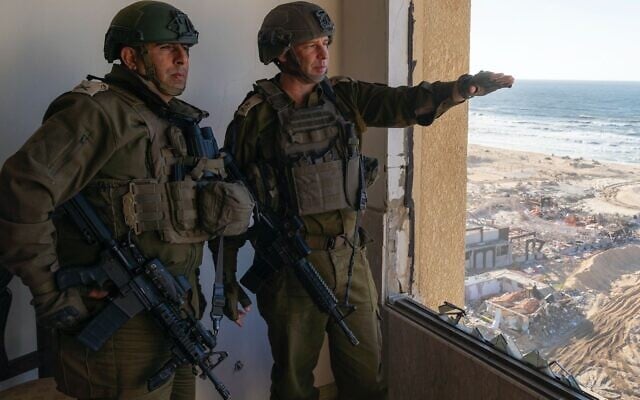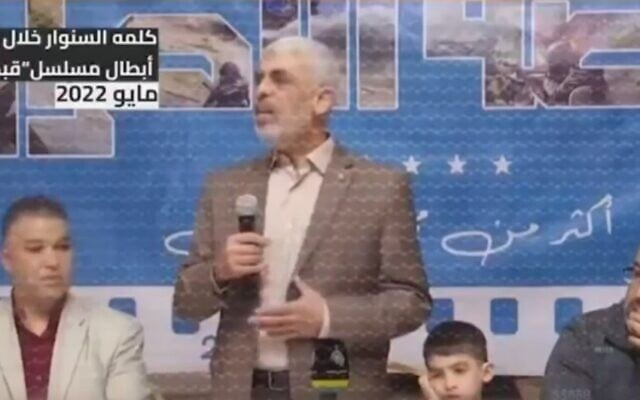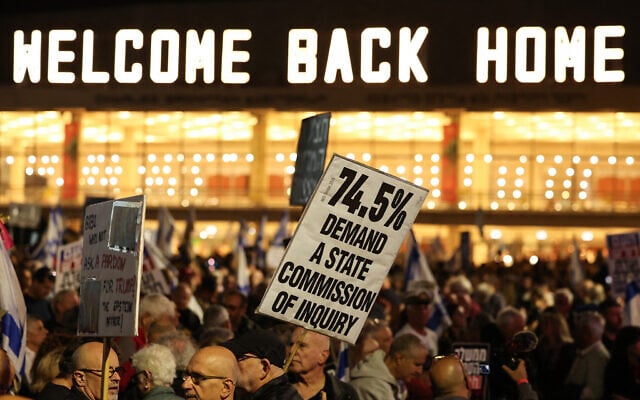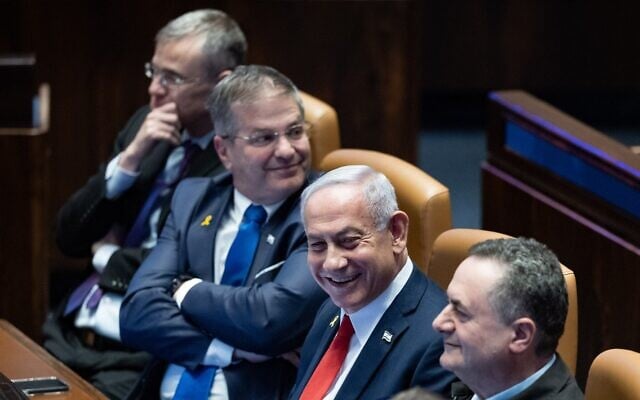This Editor’s Note was sent out earlier Wednesday in ToI’s weekly update email to members of the Times of Israel Community. To receive these Editor’s Notes as they’re released, join the ToI Community here.
A few days after thousands of Hamas-led terrorists burst through Israel’s largely unprotected border with Gaza, blowing holes in the puny, high-tech fence and carrying out an unprecedented slaughter in southern Israel, the head of the IDF’s southern command, Maj. Gen. Yaron Finkelman, convened the editors of Israel’s main media outlets for a briefing on what had gone so terribly wrong and how the IDF intended to destroy Hamas and ensure no recurrence.
On the wall of the room where we gathered, at the IDF’s Southern Command headquarters in Beersheba, was a chart detailing the locations of the 24 military battalions Hamas had spent years recruiting, arming, training and deploying in Gaza, complete with pictures of the battalion commanders.
That wall chart was just one minor but glaring indication of Israel’s familiarity with the Hamas war machine, on one hand, and Israel’s abject failure, on the other, to internalize how Hamas was intending to use it.
IDF intelligence had tracked Hamas preparations for an invasion for five years, obtaining an early version of the attack plan in 2018 that stated that “forces from five Nukhba companies should attack and destroy the posts belonging to the [IDF] Gaza Division… Everything will be done above ground… with [rocket] fire.” This plan also referenced the intention to “attack the kibbutzim in order to take hostages… focus on critical sites… livestream from the posts and kibbutzim.”
Get The Times of Israel’s Daily Edition
by email and never miss our top stories
By signing up, you agree to the terms
In May 2022, IDF intel obtained a later version of the invasion blueprint, which similarly described a large number of Nukhba Force gunmen breaking through the Gaza Division’s defenses and reaching cities in southern Israel. This material was put together in a document known as “Jericho’s Walls.”

Chief of the Southern Command, Maj. Gen. Yaron Finkelman (right) and Brig. Gen. Itzik Cohen, the commander of the 162nd Division, in northern Gaza, February 1, 2024. (Israel Defense Forces)
Hamas’s Gaza leader Yahya Sinwar made no particular secret of his intention to invade and massacre Israelis, en route to destroying Israel, including referencing strategic and tactical specifics. A year before he ordered the onslaught, Sinwar handed out prizes at a televised award show for a drama series broadcast on Hamas TV that showed terrorists infiltrating into Israel using white pickup trucks, disabling Israeli communications, and targeting kibbutzim and IDF bases. “This series is an inseparable part of what we are preparing,” the October 7 architect boasted.
In the months before the attack, surveillance soldiers at the border issued increasingly agitated warnings about Hamas training at the border, sending drones to destroy border cameras, detonating explosives at the border fence.
And in the hours before the invasion, Israeli intel registered that hundreds of Hamas operatives had put Israeli SIM cards into their mobile phones.
And yet Israel’s vaunted military chiefs and its highly experienced political leaders, charged above all else with protecting vulnerable citizens from murder by the enemies on our borders, simply refused to accept what that mountain of accumulated evidence conclusively demonstrated: The terrorist army on the southern border was about to invade.

Hamas’s Gaza chief Yahya Sinwar speaks at what Israel’s Channel 12 says was a 2022 ceremony awarding prizes to a Hamas TV drama on a Hamas invasion of Israel. (Channel 12 screenshot, used in accordance with clause 27a of the copyright law)
This was not a failure of the imagination. It was a failure, an adamant refusal, to face the terrible facts and act accordingly to prevent the massacre. A failure that, consequently, found Israel with a reported total of 13 tanks deployed that Shabbat, Simchat Torah morning along the entire length of the Gaza border. A failure that enabled Hamas to carry out the deadliest day’s attack on Jews since the Holocaust and the most devastating assault on Israel in its entire modern history.
How and why was the obvious so determinedly ignored? How was Israel’s intelligence establishment lulled and duped? How did Hamas fool Israel’s supposedly cutting-edge SIGINT capacities? Was there an overreliance on SIGINT at the expense of traditional HUMINT? How was the IDF’s devil’s advocate unit, whose sole purpose is to question potentially complacent mis-assessments, subverted?
Get to the truth; prevent a recurrence
We may think we know many of the answers to these and similar questions. The IDF and Shin Bet have themselves investigated these and other aspects of the debacle. But those were internal probes, carried out by parties that were themselves responsible. What is needed, what has been needed for more than two years, is an independent inquiry, ranging across all the organizations that failed, with the authority to compel witness testimony and get to the fullest possible explanations for what remains abidingly inexplicable — in order to ensure that nothing like October 7 can ever happen again.
Such an inquiry will need to assign blame in its conclusions and to recommend the removal of those it finds responsible — those, that is, who have not yet themselves recognized their obligation to step aside — again, because the prime requirement is to maximize the assurance that a similar cataclysm cannot recur.

Israeli anti-government protesters lift up placards during a demonstration against the prime minister and in support of establishing a state commission of inquiry into Hamas’s October 7, 2023 attacks on Israel, in Tel Aviv on November 15, 2025. (Jack Guez / AFP)
Prime Minister Benjamin Netanyahu has, from the very start of the war that was triggered by the Hamas massacre, recognized his prime culpability and sought to evade it.
He has run Israel since 2009, with only an 18-month interruption between June 2021 and December 2022. He commands Israel’s political leadership. He oversees its military and security establishment. He sets policy and supervises its implementation. The buck stops with him. Yet he has not stepped down.
Instead, Netanyahu has repeatedly asserted, in the face of multiple accounts to the contrary, that he was failed by his military and intelligence chiefs — claiming that vital information was kept from him and that he would have acted differently, even in the last few hours before Hamas struck, if he had been adequately informed and updated. But no fair-minded investigation would consider that an acceptable mitigation. He, after all, presided over the systems that he now claims let him and Israel down. His intended defense would appear to constitute further evidence of his unconscionably lapsed oversight.
Appreciating this, the prime minister has steadfastly prevented the establishment of a state commission of inquiry. Initially, he claimed that it would harm the war effort to begin the probe at the height of the conflict. Subsequently, he argued that its conclusions would not be credible since it would be headed, as is customary, by a retired Supreme Court justice appointed by the president of the Supreme Court — a body and an individual he and his coalition have strategically worked to discredit.
A show trial
Now Netanyahu has judged that this campaign of delegitimization has ripened sufficiently for him to announce the imminent establishment of the government’s own inquiry, rather than a state commission — an inquiry that the coalition has presented as independent, but is in fact anything but; an inquiry whose mandate will be set by the very government and ministers who led Israel at its darkest moment.

Prime Minister Benjamin Netanyahu sits with ministers Israel Katz (foreground), Yoav Kisch and Yariv Levin (background) in the Knesset, during a debate on calls for a state inquiry into the failures surrounding October 7, 2023’s Hamas invasion and slaughter, on March 3, 2025. (Chaim Goldberg/Flash90)
This government-mandated commission will not best ensure the prevention of the next disaster because that is not its goal. Its mission, rather, is to deflect responsibility in order to enable the survival in public office of Netanyahu and his key colleagues, as Amichai Eliyahu, one of the ministers appointed by the prime minister to set the panel’s terms, explained at some length on Tuesday.
The panel, Eliyahu declared, will carry out a “broad investigation” beginning with the signing of the Oslo Accords with the PLO in the 1990s. It will focus on “the rotten root, without ignoring the elephant in the room: the role of the state prosecution, the judicial system, former [IDF]chiefs of staff, and all those who weakened our deterrence,” he elaborated. “The commission will also have to investigate those who imposed absurd and delusional moral rules on the IDF, rules that tied the hands of the soldiers; those who led the IDF to a mindset of victory in only one arena: the competition to be the most moral army in the world, a competition in which the only participant is the IDF.”
Those are the terms, not for a genuine effort to reach the fullest truth, but for a show trial.
An independent inquiry would presumably ask its subpoenaed witnesses, notably Netanyahu, whether they refused to face the evidence of Hamas’s imminent invasion because to have done so would have been to admit that years of policy — including encouraging the flow of Qatari money into Gaza that strengthened Hamas’s grip and freed up funding for the Hamas war machine — had been devastatingly misguided.
It would probably want to ask both political and security chiefs whether they buried their heads in the sand because they could not bear to admit that Hamas was not, as they had complacently insisted, primarily interested in maintaining calm, deepening its hold on Gaza and bolstering its leadership of the Palestinians.
It would certainly want to know why then-defense minister Yoav Gallant’s warning in March 2023, that the national rift over the government’s planned judicial overhaul was impacting the military establishment and had come to constitute a tangible threat to national security, was ignored. Instead, Netanyahu fired Gallant for his disloyalty in speaking out.
The government’s self-designed probe is unlikely to focus core attention on such matters. For a start, the minister charged by Netanyahu with overseeing the mandate for the inquiry is none other than Yariv Levin, architect and ongoing determined advocate of that ultra-divisive judicial overhaul.
And thus the transparently compromised mechanism simply won’t get to the bottom of what went wrong before, during and, yes, even since October 7. These have been two years when Israel fought back, under Netanyahu’s leadership, with immense military success against Iran and Hezbollah, and radically degraded Hamas. But it lost the support of almost all international allies, in part because of incompetent public advocacy. It failed to arrange and install an alternative to Hamas. It was unable to secure the release of all the living hostages without the assistance of the Trump administration, by which time 40 of those held in Gaza had been killed.

The 20 living hostages released on October 13, 2025: First row, from left: Elkana Bohbot, Matan Angrest, Avinatan Or, Yosef-Haim Ohana, Alon Ohel. Second row, from left: Evyatar David, Guy Gilboa-Dalal, Rom Braslavski, Gali Berman, Ziv Berman. Third row, from left: Eitan Mor, Segev Kalfon, Nimrod Cohen, Maxim Herkin, Eitan Horn. Bottom row, from left: Matan Zangauker, Bar Kupershtein, David Cunio, Ariel Cunio, Omri Miran (Times of Israel combo pic; photos by IDF and GPO)
We wait to hear whether the announced commission will clear the Supreme Court, or prompt the justices’ intervention and a fresh assault on their legitimacy by the political leadership. If it does go ahead, it will not get to the full truth surrounding October 7 because its very purpose is to shield Netanyahu from that full truth — which extends to his unique role in the failure as the most divisive prime minister in our nation’s history, a leader who stirs up the people of Israel against each other, and denounces all critics — in the opposition, the media, the wider public, even the families of hostages — as security risks and leftists and Hamas supporters.
Now, in insisting on a self-serving inquiry into the worst catastrophe in modern Israeli history, he is dividing Israel again. A state commission of inquiry will best prevent a recurrence of October 7. The Netanyahu inquiry, by contrast, subverts that essential goal. It won’t make Israel safer. It puts the defendants on the bench.
